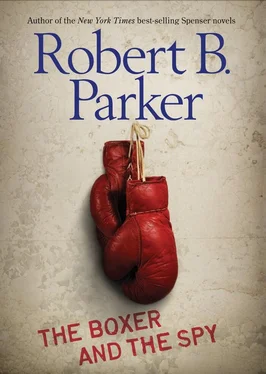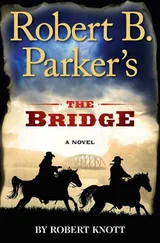Robert B. Parker
The Boxer and the Spy
For Joan, who needs no blue butterfly.
Twenty miles north of Boston, Cabot was a rich town on the water. The houses were generally big and old and had nice yards. Along the ocean-front, on Water Street, the houses were mostly bigger and older and had long front porches where people could sit in good weather and look at the ocean.
The boy liked to walk around town after dark and look in windows. He liked to see the lives being lived in the lighted interiors. Men reading newspapers, women making supper, kids doing homework. He didn’t peek in, he just looked as he walked by and felt somehow comfortable looking at the regular people doing regular things. He didn’t like to stay home so much after supper because ever since his father died, his mother wouldn’t eat supper. She’d give him his and sit with him while he ate, and drink. In a little while she would get weeping and hug him and tell him he was all she had, and it would make him really uncomfortable. So he’d go out for a walk until she got so drunk she’d fall asleep on the couch. He had gotten the timing of it down pretty well, so when he came home, he could go right to bed. In the morning there would be no mention of it. The boy didn’t have too many friends. He wasn’t mean or anything, but a lot of kids thought he was a sissy because he didn’t like sports, and he liked old movies, and he liked to draw. He knew that, but he couldn’t change himself. He could only be what he was.
There was a sort of closed-in space on the beach, at the far end, near the bathhouse, among the big smooth rocks that stuck out into the ocean, where the boy liked to sit sometimes and think about things, and wait for his mother to drink herself to sleep. It was a cloudy night, but warm for March, and the boy was comfortable in the shadows of his place in the rocks.
A man and woman walked along the beach toward his rocks. They walked close together.
“It’s okay?” the man said.
“Absolutely,” the woman said.
“The property is in my name?”
“Yes.”
“Even though it’s a school project,” the man said.
“Yes. Cost will simply be subsumed in the school budget,” the woman said.
“And the fact that it’s on conservation land?”
“That particular parcel,” the woman said, “is no longer conservation land.”
“How’d you do that?”
“You know the right buttons to push,” she said, “you don’t have to push many in a town like this.”
The boy sank as low as he could in his place. There was no moon showing. Thank god it was cloudy.
The man and woman had stopped and stood perhaps three feet from the boy, above the high water line, looking out over the dark ocean.
“It’ll stand up?” the man said.
“It’ll stand up and the way is greased for the next project and the one after that,” the woman said.
“Did it cost us?”
“Money? No. We don’t have to split the money with anyone. I scratched some backs, they scratched mine. I know how this town runs.”
“You ought to,” the man said. “You run it.”
“I do,” she said.
“What do you think we can sell the house for?”
“My guess, a million eight,” she said.
“Nine hundred thousand each, he said. “And how much did it cost us?”
She laughed softly.
“Nothing,” she said, and turned and kissed him hard on the mouth. They held the kiss, and then slowly separated.
“Give me a few minutes,” she said. “If people saw us coming from the beach together, at this time of night, they might get the wrong idea.”
The man laughed.
“And they’d be right,” he said.
She laughed and patted his cheek and turned and walked away down the beach. He watched her as she went. The clouds that had hidden the moon drifted so that he could see her in the moonlight as she turned up the path and walked toward the street where they had parked separately. The moonlight seemed to the boy as bright as day. The man turned back and looked directly at the boy. Their eyes met.
“You,” the man said. “You were there...”
The boy was frozen. He could hear the heavy rasp of the man’s breath.
“You heard everything,” the man said.
“I didn’t hear anything,” the boy said.
“Yeah,” the man said. “You did.”
“Keep your shoulder up,” George said, “and turn your hand so you hitting like with the first two knuckles.”
Terry nodded. He was wearing sneakers and knee-length black shorts and a blue tank top. George held up the big padded mitts.
“Left foot forward,” George said. “Stay balanced. Knees bent. Push against the floor.”
Terry nodded.
“Left jab,” George said, “left jab, right cross.”
“Two lefts,” Terry said.
“Yep. Crisp. Make his head snap.”
Terry went into his stance. His hands and wrists were taped. Over the tape, he had on big blue boxing gloves. He put the left one up near his temple and the right one a little lower, near the hinge of his jaw. His left foot was forward. He shuffled forward slightly and jabbed with his left, torquing his forearm so the punch would land the first two knuckles. And again. Both punches were off-center and slid off the mitt without the satisfying pop you got when it was solid.
“Set up,” George said.
Back to his stance briefly, then the right cross. It popped into George’s left mitt. Better.
“The jabs sucked,” Terry said.
“They were good punches,” George said. “They would have done the job. They just didn’t hit the sweet spot.”
“Right cross was there,” Terry said.
“Supposed to be,” George said. “Let’s do it again.”
“Same thing?”
“Same thing.”
They did it again, and three more times. Terry never got all three punches right in sequence.
“Take a break,” George said, and nodded at a folding chair.
“What the hell is wrong with me?” Terry said. “I can’t get it.”
George smiled. “How old are you?” he asked.
“Fifteen,” Terry said.
“Not too late,” George said. “I think you got time to learn.”
“We been working at it for two months now,” Terry said.
“Take three, four thousand punches, each punch, ’fore you groove the muscle memory,” George said.
“How many you think I’ve done?”
“‘Bout three hundred,” George said.
Terry worked on his breathing. He still couldn’t believe how hard it was to box, how tired he got, how quick.
“How many you think you’ve done, George?”
George smiled and squinched his eyes and tilted his head back as if he were figuring.
“A million,” he said. “And eight.”
“Eight,” Terry said.
George was a solid-looking black man, with a modest potbelly and graying hair. He shuffled his feet a little and put a tight left hook into the heavy bag. The bag nearly came loose from its tether.
“Nine,” George said.
They both laughed.
“Doesn’t that hurt your hand?” Terry said.
“Nope.”
“You’re not wearing gloves, you’re not even taped. Why doesn’t it hurt?”
“Used to it,” George said.
He was wearing black sweatpants and a gray T-shirt. His arms were still muscular looking.
“How old are you, George?” Terry said.
Читать дальше












